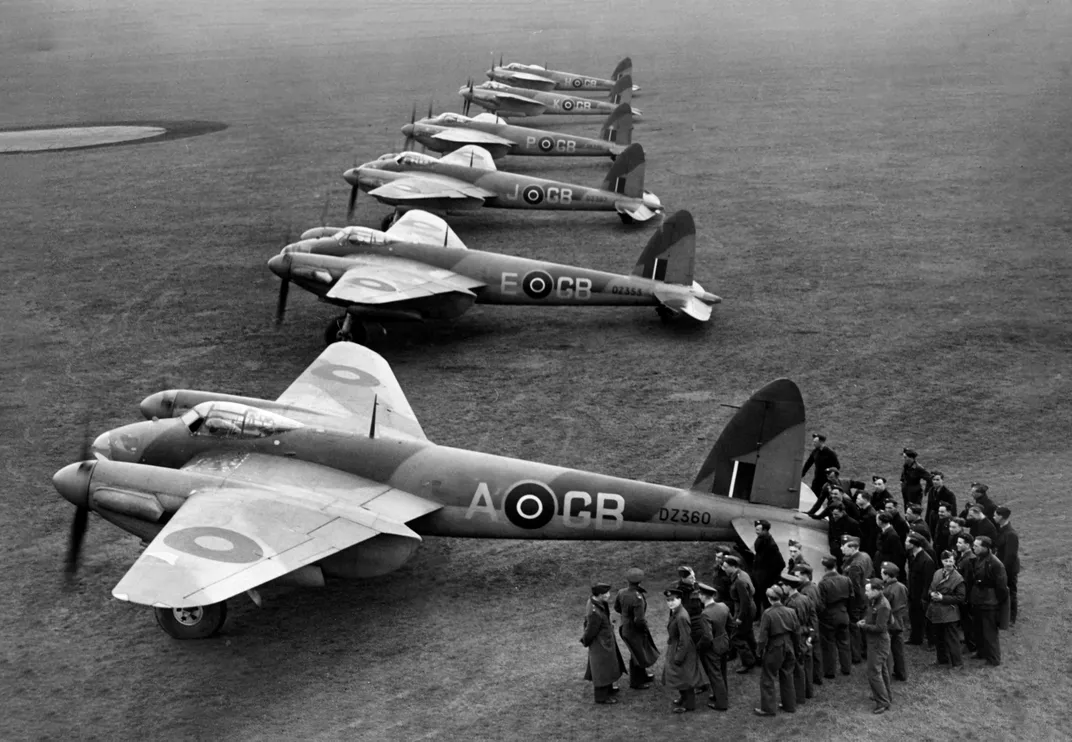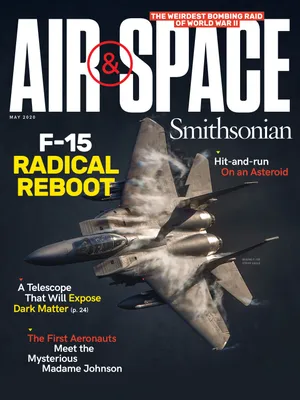World War II’s Strangest Bombing Mission
The RAF knew how to cut the power on propaganda.
/https://tf-cmsv2-smithsonianmag-media.s3.amazonaws.com/filer/a8/1c/a81c3652-546d-44f5-9e51-c667b92d6c23/29c_am2020_c46kan_live.jpg)
Reichsmarschall Hermann Göring was beside himself with anger. Years before, he had told the people of Germany that no enemy aircraft would ever cross the country’s borders. Now, on January 30, 1943, a national day of celebration marking the 10th anniversary of Hitler’s rise to power, Göring was made to look like a buffoon.
Dodging in and out of slate gray clouds, Royal Air Force bombers from No. 105 Squadron howled across Berlin. With bomb doors open and Merlin engines at their limits, the wail from a trio of de Havilland Mosquitos mixed with blasts from anti-aircraft batteries below. If everything went as planned, all that noise was going to be on the radio.
In Berlin, amid the grim news from the battlefronts in North Africa and Stalingrad, the January 30 celebration was intended to take German minds off their fallen soldiers and reversals of fortune. The Nazis were going to have a parade. Göring, one of the most powerful figures in the National Socialist German Workers’ Party, was about to deliver a speech to kick off the opening ceremonies in the capital city. British operatives knew it all. They even found out what time the Luftwaffe commandant was due to step to the podium at the Air Ministry Building—exactly 1100.
Royal Air Force leaders had dispatched orders to a pair of Mosquito squadrons experienced in low-level attacks. “I was playing [cards] in the crew room when my driver first told me we were going on an op,” Sergeant Richard Charles “Lofty” Fletcher later told reporters. “I must admit I was a bit shattered when I found out it was Berlin.”
The 400-mph Mosquitos were undertaking the RAF’s first daylight bombing attack on Germany’s largest city. Their target was not the parade route or even the Reichsmarschall himself, but something bigger. It didn’t take a top-level English spy to figure out that Göring’s remarks would be transmitted to the far corners of the Third Reich. The bombers banked and streaked towards Berlin’s Haus des Rundfunks—the headquarters building of the German State broadcasting company.
Göring and the radio building were slightly more than four miles apart—a distance that the Mosquitos could cover, going all-out, in roughly 40 seconds. And the cacophony they brought with them traveled even faster. As the mics went live and Göring began to speak, the roar of impending catastrophe became audible over the radio.
The broadcast engineers faced a terrible choice: They could relay the horrible echoes of the air raid, unfolding live, or they could shut down the transmission. In the Reichsmarschall’s moment of glory, they cut the feed and dove for cover.
Soon after, with trembling hands, a station employee managed to slip a record onto the turntable and broadcast a scratchy version of Anton Bruckner’s Symphony No. 7 in E major to a puzzled nation. It would be one hour and three minutes before Göring returned to their radio speakers.
Famously, the RAF’s speedy wooden workhorses left a lasting impression on Göring. According to a 1973 history of the Luftwaffe, he later blustered, “The British, who can afford aluminum better than we can, knock together a beautiful wooden aircraft that every piano factory over there is building…. They have the geniuses and we have the nincompoops. After the war is over I’m going to buy a British radio set—then at least I’ll own something that has always worked.”
After the bombers attacked, the rallies and parades went on in Berlin. Still fuming, Göring rode in his limousine to another speaking engagement. Under a massive eagle and swastika flanked by Nazi flags three stories tall, he addressed thousands assembled at the Schöneberg Sportpalast—Berlin’s biggest indoor sports and meeting venue.
The Reichsmarschall was not the only high-ranking Nazi official at the event. Though the Führer himself was a no-show, he had sent along one of his closest associates, Reichsminister of Public Enlightenment and Propaganda Joseph Goebbels.
Goebbels stepped up to the lectern at precisely 1600—the exact moment that a second trio of Mosquitos, these from RAF No. 139 Squadron, bullied their way into Berlin’s airspace. By now, the ground defenses around the city were on full alert and sending up withering fire in great fusillades. The violent uproar was all the better for the British raiders—their sole job was to force the rattled radio operators to broadcast the chaos. Like the previous raid, the attack did little damage.
This time, the audio engineers stayed with Goebbels, who delivered his address punctuated by the faint sounds of bomb blasts, shell bursts, and roaring engines. By the time he had finished, the Mosquitos were far to the west, dashing for home.
The mission was almost completed when one of the retreating bombers was struck by anti-aircraft fire. The Mosquito crashed some 50 miles from the target, killing Squadron Leader Donald F.W. Darling, D.F.C. and Flying Officer William Wright.
Darling was a 24-year-old combat veteran from London, who had been awarded the Distinguished Flying Cross a year before for voluntarily undertaking numerous, dangerous night missions. His navigator, Wright, was from Bedford, a 34-year-old member of the RAF Volunteer Reserve. In the Mosquito, the pilots had flown side by side on one of the most unusual missions of the war. Today, they remain side by side, at the Commonwealth War Cemetery, located within the Berlin city limits.
Besides taunting Nazi leadership, the speech-killing missions brought back valuable information, including flight times, defenses, and fuel consumption rates, which were used to create flight profiles for future attacks on the capital. Upon return, the surviving flight crews gathered for the press. Sergeant “Lofty” Fletcher summed the mission up in a few nervous sentences, seemingly more intimidated by reporters than combat: “We got over to the other side…and we…we approached Berlin above the cloud. We added our contributions to the festivities and, uh…headed for home. I personally didn’t see any flak. But I was told there was quite a lot of it knocking around. But after all, what the eye doesn’t see the heart doesn’t grieve over.”
The operation, which was equal parts major public relations coup and dirty schoolboy trick, hammered home to nearly everyone in Germany that they were no longer safe from aerial attack.

/https://tf-cmsv2-smithsonianmag-media.s3.amazonaws.com/filer/a7/dd/a7ddb682-4ed7-4a6d-b586-f24d95155f35/plane.jpg)
